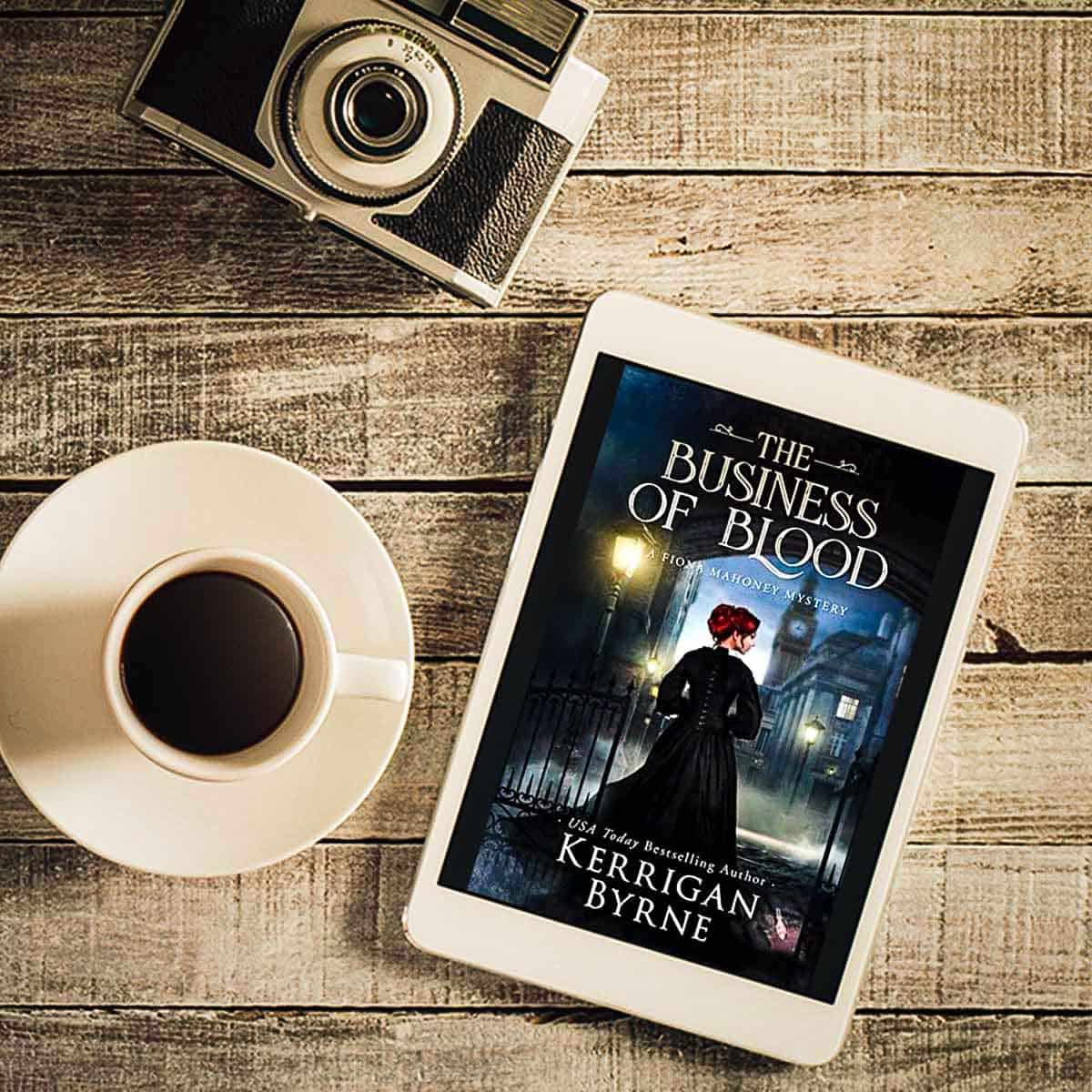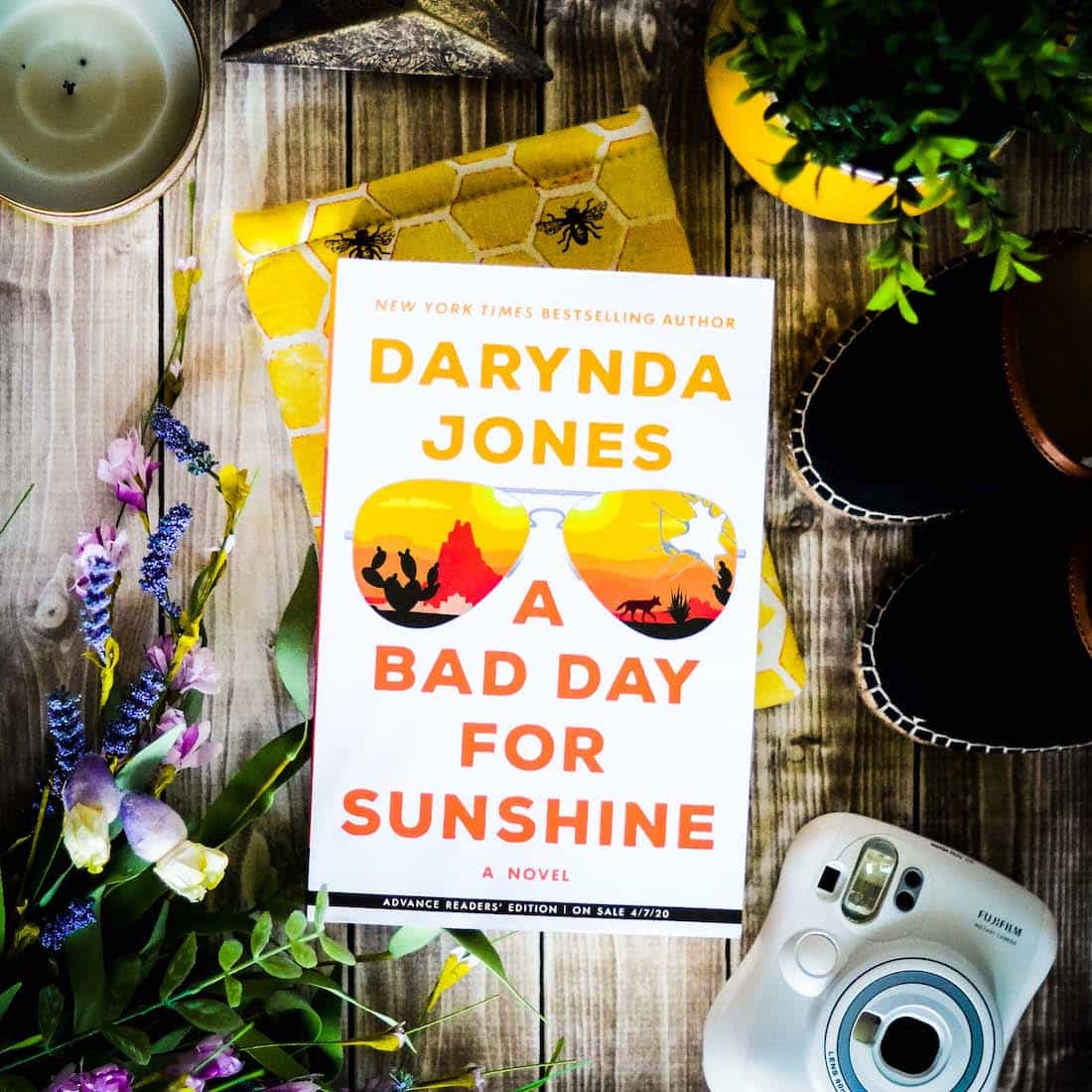
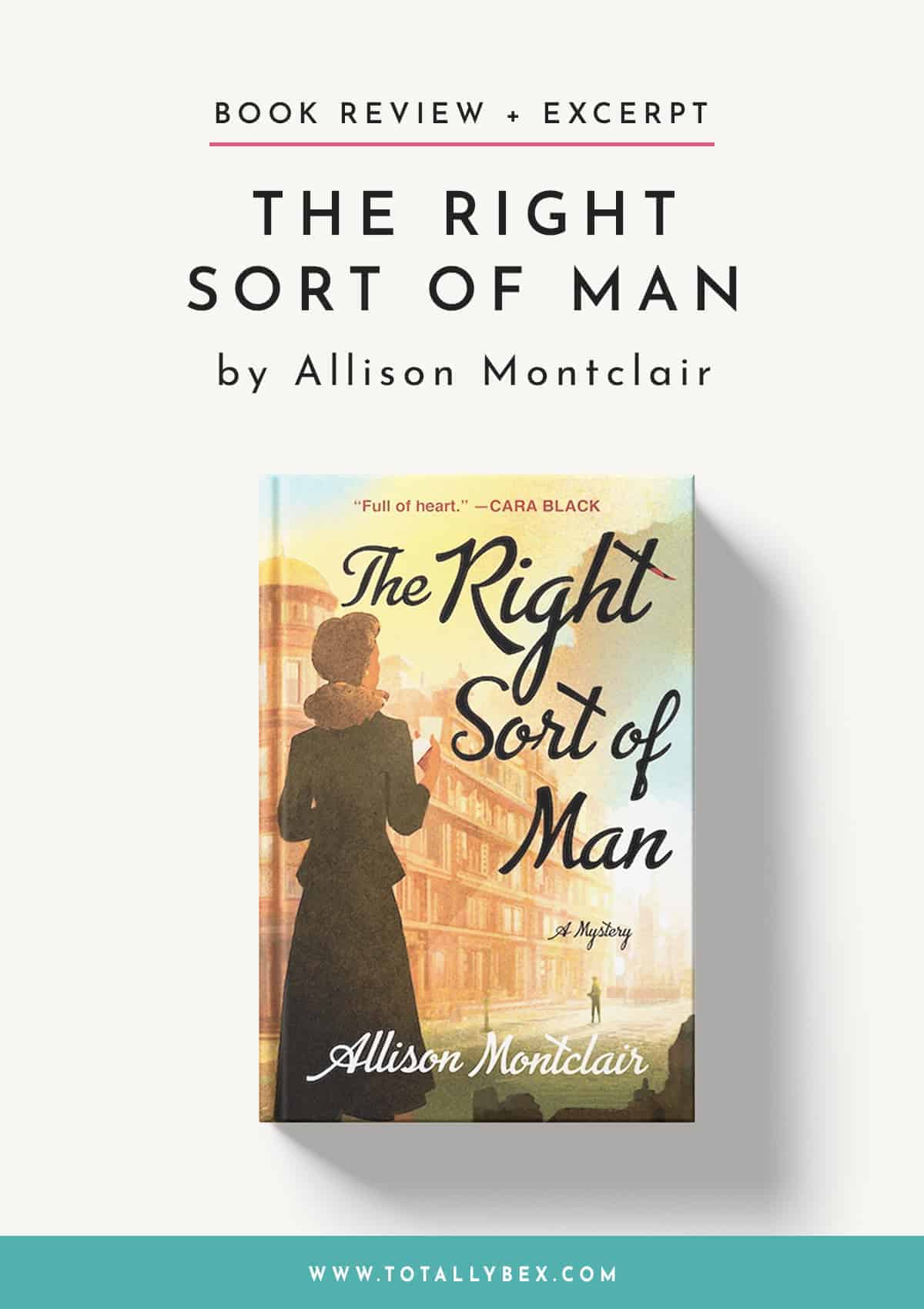
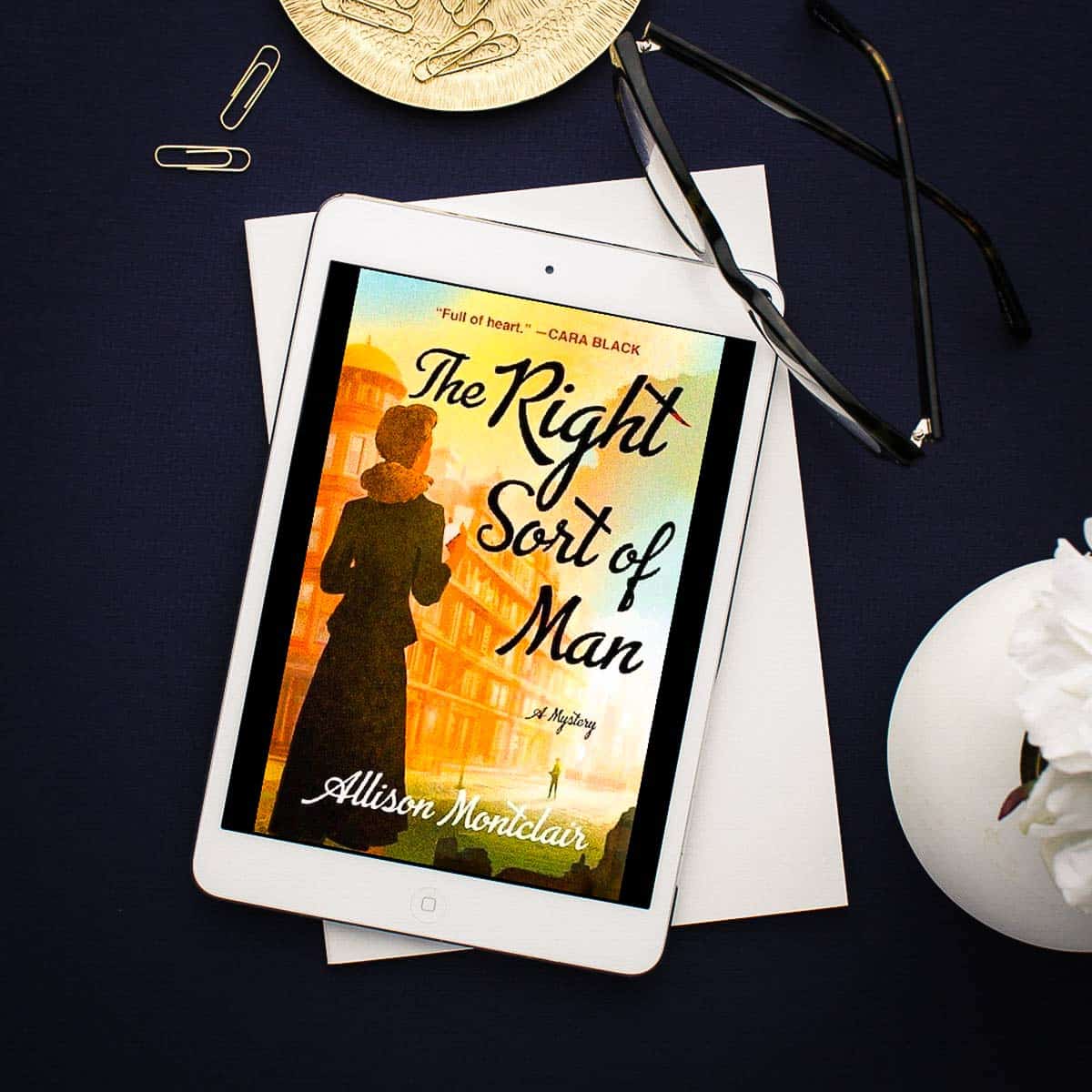
The Right Sort of Man
Review of The Right Sort of Man
Written in snappy prose with vivid imagery of 1940s England and highly-detailed characters, The Right Sort of Man immerses you in the world of matchmaking and mystery. While parts of the story are fast-paced and funny, others are quite somber and require more mental processing. The savvy skills and witty repartee harkens back to the time of gumshoe detectives in black and white movies.
The war has ended and everyone is hopeful for the future, but for those who need a little help in the love department, there’s the Right Sort marriage bureau. Gwen and Iris are a mismatched pair who bring completely different skill sets and personalities to the business, but who work together seamlessly to match clients while also solving a murder. They go together like Cagney and Lacey with a dash of Jessica Fletcher thrown in for good measure.
I really enjoyed the change of pace from my usual contemporary romances and found this cozy mystery to be the perfect ‘palate cleanser’. All of the rich details helped to make the story fit the time period and the fact that it takes place immediately after the conclusion of World War II, not everything was perfect; buildings and lives were still being repaired from all of the damage the war had wrought on the citizens of London.
If you’re in the market for a cozy mystery to fill an afternoon with pleasurable reading, I would definitely recommend The Right Sort of Man. The heroines are intelligent and highly self-sufficient, the story is enjoyable but not graphic, and the conclusion will leave you wanting more of this sleuthing duo.
Excerpt from The Right Sort of Man
Tillie climbed the stairs from the Bond Street Station out to Davies Street, blinking in the afternoon light. She had directions, but the directions were from Oxford Street, and she didn’t know whether that was to the right or left. She felt like the over- whelmed child that she had been the first and last time she had come to Mayfair, when her dad took her on a special shopping expedition after a rare successful day at the track. She dragged him into shop after shop, looking at all of the clothes, the toys, the sweets, her voice a non-stop series of squeaks and squeals while her dad beamed at the happiness he had produced all because the favourite in the fifth race at Kempton Park had snapped a foreleg and the long shot managed to skirt the subsequent pileup of horses and jockeys and push its nose past the other survivors. Two horses were put down after that race, and three jockeys went to hospital, but Dad came out of it forty quid ahead, so tragedy be damned.
She wasn’t even certain what he had bought her that day. Some pretty printed dress, she thought. Probably from Dickins and Jones. One that she outgrew within months, because Dad would never think of buying a size or two up, but that day was still the best of her life. So far.
Dickins and Jones was bombed during the Blitz. She read about it the morning after it happened, thinking about being there with Dad back in—’28? ’29? She cried when she read about it, cried like she was a little girl again, she who had never shed a tear when friends and family were lost. It was as if the Germans had attacked her best memory.
There it was, on the left. Oxford Street! She reached into her handbag and pulled out the scrap of paper with her directions.
It was June, 1946. The war was over, and Tillie La Salle had come back to Mayfair to shop.
Only this time, she was shopping for a husband.
A right, two blocks, and another right brought her to her destination. She gawked when she saw it. It wasn’t the appearance of the building itself that caused her astonishment. It was very much an ordinary, turn-of-the-century structure with bricks of a dull, almost muddy red, four storeys with not much in the way of falderal in the edging of the windows or the parapets. But it was the only building still standing on this particular block. On both sides, piles of rubble and a few ruined walls lay where similar buildings once stood, bracing their surviving neighbour. To the right, a solitary bulldozer was scooping up shattered pieces of brick, concrete, and wood and unceremoniously depositing them into a waiting lorry.
She walked past, wondering which phase of the German air assault had devastated this particular block, and what quirk of Fate had missed leveling the very building containing the goal of her journey.
The driver of the lorry was leaning against the cab. He caught sight of her, then took off his twill cap and waved.
“’Allo, gorgeous!” he shouted. “Give a working man a smile!” “You don’t look like you’re working at the moment,” she replied. “They also serve who stand and wait,” he said. “Fancy a cuppa?” “Some other time,” she said.
“Name’s Frank,” he said, giving an exaggerated bow. “I’m here all week.”
“Save some love for the wife,” she advised him.
He laughed and replaced his cap, his wedding ring prominent. She sighed and continued to the building. On the front by the entry was a small collection of signs advertising the occupants. Amidst a few drab placards for accounting and typing services was a cheerful light green one with large hand-painted yellow letters reading, the right sort marriage bureau. miss iris sparks and mrs. gwendolyn bainbridge, proprietors.
Tillie hesitated, then thought how easily she had just been ac- costed in the street by a married man.
“No faint heart, Tillie,” she admonished herself. “This is why you came.”
She took a deep breath, then walked through the door.
There was no reception, merely a cramped hallway with a daunting set of stairs to the right and a narrow passageway directly ahead that vanished into darkness with alarming rapidity. An elderly, unshaven man in dingy overalls was mopping the floor. She ignored him and turned her attention to the building directory.
“If you’re looking for a husband, they’re on the top,” called the custodian, his sporadic yellow teeth flashing in what she assumed he meant to be a friendly smile.
“I see that,” replied Tillie, spotting a smaller version of the green placard. “Thanks. Don’t you think there ought to be more light down here?”
“No point,” said the custodian. “It’s all vacant, innit?”
She took the stairs, initially at a nervous trot to get away from the gloom of the ground floor and the vaguely menacing demeanour of the custodian. By the time she reached the top, her pace had slowed considerably.
This hallway was brightly lit, however, and in the middle of it, she saw yet another green sign proclaiming her journey’s end. She paused to catch her breath, then walked up and rapped on the door. The woman who opened it was her height, a brunette maybe six or seven years past Tillie’s twenty-two. She gave her a quick, inquisitive look, then smiled.
“Miss La Salle, is it? Come in, come in.”
Tillie found herself ushered in and plopped onto a wooden chair that creaked ominously. There were two desks in front of her on either side of a single window. They looked like they themselves had served during the war, perhaps seeing combat in some skirmish against German furniture, and now sat battered but unbowed, the one on the left jammed against the wall for partial support, a book stuffed under one leg which was noticeably shorter than the others.
The room itself was painted the same soothing light green as the placards. On the wall to the right hung photographs of happy couples at their weddings, with announcements from the Guardian and the Evening Standard taped to their frames. There was an ancient filing cabinet in the corner that could have told tales from previous wars to the two desks.
“How do you do, how do you do?” rattled off the woman. “I’m Iris Sparks; call me Sparks, everyone does. So nice to meet you, and you’re perfectly on time. You made it up the steps, hurrah! The first hurdle on the path towards happiness is those steps. They’ve been wonderfully firming for my legs, I must say. I’ve lost eight pounds since we started up. This is Mrs. Bainbridge, my partner.”
From behind the desk on the left, a very tall woman rose grace- fully and came over to shake her hand.
“How do you do, Miss La Salle?” she said.
Tillie tried not to gape. Mrs. Bainbridge was elegant, blond, and wearing an impeccably tailored silk suit that must have been sealed in a cedarwood closet for the duration of the war to have been resurrected so perfectly. The woman had a patrician air that was completely out of place in this small, solitary office, yet seemed wholly at ease in spite of it. She could have stepped from the pages of the Tatler, or been the slumming aristocratic sidekick in a Jessie Matthews musical, lacking only the art deco sets for the appropriate backdrop.
Sparks noticed the young woman’s attempts not to stare and grinned.
“Impressive, isn’t she?” she commented. “Don’t worry, she’s one of us.”
“I’m sorry,” stammered Tillie. “I didn’t mean to be rude.”
“Not at all,” Mrs. Bainbridge reassured her as she resumed her seat. “Now, you are looking for a husband.”
“That’s right,” said Tillie.
“Then you’ve come to the right place,” said Sparks, sitting on the edge of her desk and picking up a pair of typed forms. “Business first. Before we ask you a single question, we want you to know what you are committing to, and more important, what services we provide. We are a marriage bureau, one of two such in London, li- censed to arrange meetings between eligible single people. For an initial fee of five pounds, you receive our unwavering efforts to find you a suitable husband. We currently have eighty-three single men on file, as well as ninety-four women, all of whom have been subjected to questioning by Mrs. Bainbridge and myself—”
“Which is rigorous,” interjected Mrs. Bainbridge.
“As you will see for yourself,” continued Sparks. “We cannot, of course, guarantee that marriage will result from this.”
“Or that happiness will result from marriage,” added Mrs. Bain- bridge. “That would be up to you.”
“But we’ve already had seven weddings result from our efforts in the three months since we’ve opened,” said Sparks.
“Seven!” exclaimed Tillie. “In only three months? Such short engagements!”
“The war is over, and people want to start normal life up again in a hurry,” said Mrs. Bainbridge. “And there has been so much loss and devastation—”
“Oh, yes,” said Tillie. “It’s amazing this building’s still up.”
“Incendiaries to the left of us, doodlebug to the right,” said Sparks. “Yet here it is, and here we are.”
“It’s why we chose this location,” said Mrs. Bainbridge. “Some- thing about it says hope, don’t you think?”
“It does,” agreed Tillie. “I hope there’s some hope left for me.” “For five pounds, there will be,” said Sparks. “Now, there’s one more part of the contract, and this is the catch. Should you end up marrying a man who you met through our efforts, then each of you will pay us a—call it an achievement fee.”
“How much?” “Twenty pounds.”
“Twenty quid?” exclaimed Tillie. “Each,” said Sparks.
“That’s an awful lot,” said Tillie.
“But don’t you see, that’s the incentive for us to work so hard on your behalf,” said Mrs. Bainbridge. “It will be in all of our best interests to find you the right sort of man.”
“Moment of truth, Miss La Salle,” said Sparks, holding up the papers in her hand. “Five pounds and a signature, and we shall commence your quest for matrimony. Are you with us?”
“Well,” said Tillie, considering. “It can’t be any worse than what I’ve been going through.”
“It will be so much better,” said Mrs. Bainbridge confidently. “Right,” said Tillie, opening her handbag.
She counted out five pounds and handed them to Sparks. “Bravo,” said Sparks. “Come sign your contracts. There’s one for you, one for our files.”
She handed her a pen and vacated the desk so that Tillie could sign. Tillie looked over the contract carefully.
“One question,” she said. “How do I know you don’t grab the best boys for yourselves?”
“We have a firm policy of never dating clients,” said Sparks. “We even put that in the contract. Item seven.”
“You really did,” marveled Tillie. “It seems like you thought of everything.”
She signed them both, then handed them and the pen to Sparks. “Well done,” said Sparks, sitting behind her desk and taking out a steno pad. “Now, let’s find out more about you. We have your name, and you gave me your address when you phoned for the appointment. Ratcliffe Cross Street. That’s in Shadwell, yes?”
“Shadwell born, Shadwell raised, and I work there as well,” said Tillie.
“You like it there, do you?” asked Sparks.
“I want to get out of there as soon and as fast as I can,” said Til- lie fervently. “I will settle for a lesser man if he lives far from Shadwell. Find me a farmer up north, and I’ll learn to herd ducks with a willing heart.”
“I don’t think we have any duck-herding farmers at the moment,” said Sparks.
“I’ll take any spare dukes or millionaires you have lying about, then,” said Tillie.
“I’m afraid we’re fresh out,” said Mrs. Bainbridge, smiling. “Let’s start with the basics,” continued Sparks. “Religion?” “Church of England,” said Tillie.
“Looking for the same?”
“I suppose. I don’t go enough. I wouldn’t mind Catholic, if he’s Continental and a gentleman.”
“So, French, Italian . . . ?” “I’ve got some French in me.”
“We suspected as much from the name,” said Mrs. Bainbridge. “Yeah, that’s a dead giveaway,” said Tillie. “A couple of Free French soldiers tried chatting me up, but I don’t speak a word of it.
Didn’t stop them from trying, though, did it?”
“So, Catholic acceptable,” said Sparks, writing it down. “But not Irish,” added Tillie hastily.
“But not Irish,” repeated Sparks.
“I mean, I don’t want you to think—”
“My dear, we do not judge,” said Mrs. Bainbridge. “Your preferences are respected here.”
“Right,” said Sparks. “Education.”
“In school until I was fourteen. Wasn’t good at it, and my family needed me to work, so I quit and got a job.”
“And you’re currently working in Shadwell.” “Yes. At a dress shop.”
“Do you sew, then?” asked Mrs. Bainbridge. “Make alterations and such?”
“We have a tailor,” said Tillie. “He’s the owner and does all that. I can help out in a pinch, but mostly I’m the shopgirl. I show the ladies the styles, make recommendations, keep the books.”
“You’re like us, only with dresses,” commented Sparks. “Although we don’t offer alterations,” said Mrs. Bainbridge.
“Perhaps we should.”
Tillie giggled at the idea, and she and Mrs. Bainbridge began trading suggestions that quickly became ridiculous. Iris took the opportunity to jot down a quick assessment of their new client.
Certainly a pretty girl, she thought. Bright-eyed, naturally perky when she smiled, good teeth when she laughed, although she was missing one on the top left. Iris wondered what circumstances led to that blow to the mouth. Miss La Salle knew how to wear makeup to good effect, just the right amount of powder and rouge without being garish or common. Nice raspberry red lipstick. And her clothes—the jacket was a lovely light blue cloth bolero with an abundance of white trim; her collar was of a cheerful polka-dotted pattern; her kiltie was a riot of pleats, stopping below the knee, with a good set of taupe nylons clinging to a good set of gams. And sensible shoes, as a shopgirl must have.
“Now, as to the type of man you are looking for,” Sparks said. “You mentioned wanting to abandon Shadwell. How far would you be willing to go?”
“How far can you send me?” “Australia,” said Sparks. “Australia?” exclaimed Tillie. “India. Burma. Africa . . .”
“We have several clients who were here for the duration of the war, and wish to return home, a blushing bride by their side,” added Mrs. Bainbridge.
“Oh,” said Tillie. “I never even thought . . . I mean, my Mum and Dad are still here. If anything happened to them . . .”
“Then you’d want to be able to see them quickly,” finished Mrs. Bainbridge. “We understand entirely. Family is important.”
“To some,” said Sparks. “Age?”
“Not, you know, doddering about. Fit. Able. I’m not a nurse- maid, am I?”
“Certainly not,” agreed Mrs. Bainbridge. “Any limit?” “I suppose forty? Fortyish?”
“Ish,” muttered Sparks, writing it down.
“Now, this one is somewhat delicate,” said Mrs. Bainbridge. “Most of our bachelors served our country. Not all of them emerged unscathed. We have men who lost limbs . . .”
“Oh, dear,” said Tillie.
“We have a lovely gentleman who was badly burned,” said Sparks. “It’s startling when you first meet him, but within minutes of speaking to him, you completely forget about it.”
“So, our question is would you consider one of these wounded or disfigured heroes?” asked Mrs. Bainbridge.
“I know that I’m supposed to say yes, of course,” said Tillie. “That I would do anything for the lads. But I’m the one who would have to live with them forever, aren’t I?”
“You are,” said Sparks.
“I’d like, you know, I’d like a bit of something to look at while I’m doing the wifely duty,” said Tillie. “It’s what they want from me, so why shouldn’t I be the same?”
“You’re saying that looks are important,” said Mrs. Bainbridge. “I suppose they shouldn’t be,” said Tillie. “But I’ve had men chasing after me since I was too young, and it had nothing to do with my personality.”
“Wouldn’t you rather be wanted for your personality?” asked Mrs. Bainbridge.
“Yeah, I would,” said Tillie. “It’s why I came here, isn’t it? And I know that I just said I want a man who looks all right, so bad on me for being confusing. He doesn’t have to be a heartstopper. I just want something more than the bare minimum. And if he’s missing a leg, he won’t even be that.”
“We’ll see what we can do,” said Mrs. Bainbridge. “Any other physical preferences?”
“All of his hair still on his head,” said Tillie promptly. “Noted,” said Sparks. “Height?”
“Be hard to find one shorter than me,” said Tillie. “Oh, no, it isn’t,” said Sparks. “We have several.”
“Well, save them for the girls who like short men,” said Tillie. “Right,” said Sparks. “If they run to fat . . .”
“We all will eventually,” said Tillie. “With luck and no rationing.
I don’t mind a bit extra around the waist.” “Interests? Hobbies?”
“Never had time or money for any,” said Tillie. “Anything you don’t want in a gentleman?” “No gambling. No drinkers.”
“Smokers?” asked Sparks.
“As long as he shares,” she said, grinning. “Ciggies are my secret vice.”
“Right, that should give us enough of an idea to pair you up with someone,” said Sparks.
“How long will it take?” asked Tillie.
“We’ll be in touch with a suitable candidate by this afternoon’s post,” said Mrs. Bainbridge. “You should be hearing within two to three days.”
“That quick?” exclaimed Tillie. “I won’t even have time to get my hair done.”
“Your hair looks fine,” Mrs. Bainbridge assured her.
“Oh, Lord, I’ll be in all of a dither waiting,” said Tillie. “It’s rather exciting, isn’t it?”
“That’s all part of the experience,” said Mrs. Bainbridge, rising to shake her hand once more. “So nice to have met you, Miss La Salle.”
“Likewise,” said Tillie. “Ta ta.” “Ta ta,” said Sparks.
Iris watched Tillie leave, then drummed her fingers on her desk. “What?” demanded Gwen.
“A hunch,” said Iris, getting up. “Be right back.”
She walked out of the office and peered down the stairwell. Tillie was one storey down.
“Miss La Salle,” called Sparks. Tillie looked up at her in surprise.
“One last question, if you could wait one second,” said Sparks.
She hurried down the stairs to where Tillie was waiting, then looked around to make certain they weren’t being overheard.
“Yes?” said Tillie.
“Stockings,” whispered Sparks. “What?”
“Help a girl out,” said Sparks conspiratorially. “I ruined my last pair, and I’m short coupons. Have you got a place?”
“It’s illegal,” said Tillie indignantly.
“Come on,” said Sparks. “Everyone’s got a fiddle. I’m desperate for them.”
“You’ll find me a nice bloke?” said Tillie.
“I have the perfect match in mind already,” said Sparks. “You’ll like him, I promise.”
“Well,” said Tillie, biting her lower lip while she considered. Then she smiled. “All right, then. There’s a pub called Merle’s on Wapping High Street. There’s a spiv named Archie, usually sits at one of the tables in the back with his mates. Tell him Tillie sent you, and he’ll fix you up.”
“Thanks,” said Sparks. “You’re a lifesaver.” “Anything else?”
“No,” said Sparks. “Back to work for me.” “Ta, then. Remember, no short men!” “No short men.”
“If I wanted a jockey, I’d go to the Derby,” said Tillie, and she disappeared down the stairwell.
Iris climbed back to their office and returned to her desk. She moved her Bar-Let typewriter to the center of the desk, then rolled a piece of foolscap into it.
“Did your hunch prove correct?” asked Gwen.
“It did,” replied Iris as she began typing her notes of the interview.
“What was it about?” “Her stockings.”
“Were her seams not straight?”
“The seams were straight,” said Iris. “The girl is crooked.”
“I thought so as well,” said Gwen. “Something about her struck me as shady.”
“She’s a shady lady from Shadwell,” sang Iris. “And you oughter see her shimmy and shake!”
“The music halls lost so much when you retired,” murmured Gwen. “How did her stockings set off your alarms?”
“That she had them. And that skirt—more pleats than a dozen honest English girls have, much beyond regulation.”
“I never thought about that,” said Gwen.
“Well, let’s be honest, dear, you have a ton of clothes—” “Certainly not.”
“All that I’m saying is that having used most of my coupons on this tweed suit, which I needed for this venture of ours, I am pain- fully aware of when another girl shows up wearing something non- reg. You, with your fabulous pre-wardrobe, are not.”
“I could loan you—”
“No, thanks,” said Iris. “I would have to stand on Miss La Salle’s shoulders to fit into one of your lovely frocks.”
“I was going to say stockings.”
“Same problem,” sighed Iris. “Oh, if I had your legs, I could get places in half the time. Why did you think she was—oh!”
There was a man standing at the door, wearing a dustman’s coverall, his cap in hand.
“Sorry, didn’t mean to intrude,” he said. “Is this all right, or do you need to make an appointment?”
“You’ve just made one,” said Mrs. Bainbridge, stepping from behind her desk to usher him in. “I am Mrs. Bainbridge. This is my partner, Miss Sparks.”
“How do you do?” said Sparks.
“’Ow d’you do?” returned the man. “Name’s Alfred Manners, though me mum says I got none, ha ha!”
“Ha ha,” echoed Sparks.
“How may we help you, Mister Manners?” asked Mrs. Bain- bridge, directing him to the chair.
“I been passing by, regular-like,” he said, sitting down. “Keep seeing the lovely green sign, think to meself, Alf, maybe they got a girl for you.”
“Maybe we have,” said Mrs. Bainbridge.
“So, I finally decided to see what’s what,” he said. Then he looked at them expectantly.
“What’s what is we are a licensed marriage bureau,” said Mrs. Bainbridge. “We have a growing clientele of both sexes, and we seek to find couples who would be amenable—”
“Amenable. What’s that?” asked Manners.
“Compatible,” said Mrs. Bainbridge, pausing as he continued to look at her blankly. “Suitable for each other.”
“The Right Sort!” he said, brightening.
“Exactly,” said Mrs. Bainbridge. “Now, there is an initial fee—” “How much?”
“Five pounds, then—”
“Five quid!” he exclaimed. “Just to meet a girl? There’s mott shops that charge less.”
“Not just any girl,” continued Mrs. Bainbridge determinedly. “One that we believe will match up with your personality and preferences.”
“Are you saying I got preferences?” said Manners indignantly. “What you prefer, what you like in a woman,” said Mrs. Bainbridge as Sparks suppressed a grin.
“Oh,” said Manners. “Think you could fix me up with that bird who just left? She was a bit of a looker, no argument.”
“Which bird?” asked Sparks.
“The one what was ’ere before,” said Manners.
“Mister Manners, we maintain the privacy of our clientele,” said Mrs. Bainbridge. “As we would maintain yours should you choose to join us.”
“I don’t have five quid on me,” said Manners.
“Then let me provide you with one of our adverts,” said Mrs. Bainbridge, taking one from a pile on her desk and giving it to him. “Should you wish to avail yourself of our services, you may make an appointment.”
“Right,” he said, taking it. He glanced over the two of them appraisingly. “Are you two on the list?”
“We are not,” said Sparks quickly.
“Pity,” he said, leering. “But never say never, right?”
“Good day, Mister Manners,” said Mrs. Bainbridge. “We hope to be hearing from you shortly.”
He put his cap back on, touched two fingers to the brim in salute, then sauntered off.
They waited until they heard his footsteps fade down the stairwell.
“Never,” said Gwen.
“Never, never, never,” said Iris, and the two of them began to giggle.
“Oh, dear, he was dreadful,” said Gwen. “I’ll bet you tuppence he doesn’t come back.”
“No bet,” said Iris. “No woman is worth five pounds to him.” “You know, I believe that is the first conversation that I’ve ever
had with a dustman,” mused Gwen. “It’s wonderful how broaden- ing an experience this life is. He smelled much better than I would have expected.”
“We’re in Mayfair,” said Iris, finishing her notes. “Even the dustmen are upper-class.”
“Mott house,” said Gwen thoughtfully. “Is that what I think it is?”
“What do you think it is?” asked Iris innocently. “A, um, a house . . .”
“A house is a house, certainly,” said Iris.
“Of—ill repute,” finished Gwen, blushing deeply. “Ill repute?” gasped Iris. “You mean—a bordello?” “Well—”
“A brothel?” “Stop it.”
“A whorehouse!” wailed Iris melodramatically, pressing the back of her wrist to her forehead and swooning in her chair.
“You’re making fun of me,” said Gwen. “You knew what it was right away.”
“I did,” said Iris. “But I have the benefit of a Cambridge education.”
“Which class did you learn it in, I wonder?” said Gwen. “Are you done with that form?”
Iris pulled it from the typewriter and handed it along with Miss La Salle’s signed contract to Gwen, who read them over, then paper- clipped them together and put them inside the file cabinet in the corner behind her.
Iris took a pair of index cards, then placed a piece of carbon paper between them. She rolled them carefully into the typewriter, then typed in a short summary of Miss La Salle’s preferences and incidentals. When she was done, she separated them.
“Your turn for the carbon,” she said, handing the bottom one to Gwen. “Now, tell me—why did you think she was wrong?”
“Something about her responses,” said Gwen. “Not that she was lying so much as she was leaving some things out.”
“Do you think she warrants further vetting?” asked Iris.
“I don’t think that she’s an adventuress,” said Gwen. “But we do want to make certain we’re not foisting a criminal upon anyone. We have our reputation to maintain.”
“I’ll make some calls,” said Iris. “Should we hold off on the matching?”
“No, let’s go ahead,” said Gwen. “We promised her a quick result. If your friend with the police finds anything, we can always contact the gentleman candidate and cancel. I will say, she speaks well for one of her background. I would have expected some dropped h’s.”
“She has aspirations to higher things,” said Iris. “Right, let’s get cracking, shall we? Miss La Salle is Female Candidate Number 102.” They each wrote it on their index cards, then placed them in green metal index boxes labeled F. Then they each moved another box labeled M in front of them. “Ready?” asked Gwen. “Ready,” answered Iris.
“Then begin,” said Gwen. “And no short, bald Irishmen, as tempting as that would be.”
Iris began looking through her cards at the eligible bachelors. She found one she thought might do, pulled out the card and studied it, then placed it to the side. She glanced over at Gwen.
“No peeking,” said Gwen without looking up.
They each proceeded until they had three cards in front of them. Iris gave her group one more perusal, then switched the second and third ones. Gwen waited, her order undisturbed.
“Shall I go first?” she asked. “Please do.”
Gwen held up a card. “Sydney Collins,” she said.
“Interesting,” commented Iris. “Yes, I can see it now. He didn’t leap out. Right, my third choice is Morris Cannon.”
“Hmm,” said Gwen. “You don’t like him?”
“I think we can do better.” “Give me your second choice.” “Alex Renbourn,” said Gwen.
“Mine as well,” said Iris, grinning and holding it up. “Are we about to have a great-minds moment?”
“Let’s savour it, shall we?” suggested Gwen.
She took her final card, clutched it to her bosom, closed her eyes, and inhaled deeply. Then she turned it towards Iris.
“Yes!” cried Iris, holding hers up. “Dickie Trower!”
“I love it when this happens,” sighed Gwen. “Now, tell me why you chose him.”
“He’s an accountant, but he comes from working-class people,” said Iris. “Not a snob at all. He’s shy with women—remember how he kept blushing being in the room with the two of us? But he’s also on the move up, so Tillie will be more than happy to hitch her wagon to his rising star, or whatever that expression is.”
“You make it all so mercenary,” complained Gwen.
“I call it practical,” declared Iris. “It’s a step up for him, and she keeps the books at her shop so she’ll impress him with her economy as well as her looks. Now, on what ethereal plane did you put them together?”
“I think she’s a diamond in the rough,” said Gwen. “Mister Trower, underneath his shy exterior, can see the real value of people. He will see hers.”
“But you thought she was shady.”
“I think she’s had a hard life,” said Gwen. “I think that she’ll be forever grateful to him for making her a better one.”
“Then we are agreed.”
“We are,” said Gwen, reaching for her stationery. “Could you pass me a sheet of carbon?”
“Press hard,” intoned Iris. “You are making a copy.”
Gwen wrote out a letter to Mister Trower, detailing how to con- tact Miss La Salle, then sealed the original in an envelope, which she addressed and stamped. She put the copy in the cabinet with Mister Trower’s file.
“Earned our pay today,” she commented.
“Which reminds me,” said Iris, gathering Tillie’s banknotes. “Do you want a George or an Edward?”
“Which Edward?” “The Eighth.” “George, then.”
“Right. One for you, one for me, three for the kitty.”
She handed a pound over to Gwen. Then she crouched under her desk and slid open the false panel concealing their strongbox. She unlocked it, let the three pounds fall into it, then relocked it and closed the panel.
She straightened up, then looked at her watch.
“Shall we close up?” she asked. “No more appointments.” “Might as well,” said Gwen.
They collected their coats and left, Iris locking the office behind her.
“Walk with me as far as the park,” Gwen asked as they emerged from the building.
“Gladly,” said Iris.
They walked to Oxford Street, where there was a post box on the corner. Gwen popped the letter to Mister Trower inside, then set off to the west. Iris had to walk quickly to keep up with the taller woman, but Gwen noticed and slowed her pace.
“Thanks,” said Iris.
She took a deep breath and looked up at the clear sky, then sighed.
“Here we are, two girls in Mayfair with the evening ahead of us. It’s the height of the season, and we’re both going home,” she said. “How sad is that?”
“We’re not girls anymore,” commented Gwen. “Neither are we old maids,” said Iris.
“Speak for yourself,” said Gwen.
“Stop that immediately,” Iris said. “All right, say it’s seven or eight years ago. What would you be doing right about now?”
“I’d be changing from a cocktail dress into an evening gown,” said Gwen, looking dreamily out into the distance.
“Which one?”
“The Molyneux, I should think. It was made of crêpe-de-chine the colour of sea-foam, which brought out my eyes smashingly.”
“And where would you be going?”
“Oh, to some ball or other. Lady Londonderry’s, Lady Cunard’s, maybe one of Mrs. Corrigan’s bashes at the Dudley House. Ever go to those?”
“One,” said Iris. “Had an encounter with the son of the Ameri- can ambassador there. He was over visiting, an absolutely scrump- tious lad. Fairbanks had thrown him a party, I think at Grosvenor House, but I missed that one. I spent half the party at Mrs. Corrigan’s getting my date drunk enough for me to ditch him so I could slip off with the American.”
“Did you succeed?”
“I can tell you nothing about the second half of the party.” “Naughty girl,” said Gwen. “Which fiancé was that?”
“I was between fiancés at the time,” said Iris. “I don’t even re- member who I came with. Someone rich enough to get me into the party, but too dreary for me to leave with. Oh, no! What is it?”
Tears were streaming down Gwen’s cheeks.
“I was wearing that dress when I met Ronnie,” she whispered. “Oh, golly,” said Iris, seizing her hands. “I didn’t mean to—” “No, no,” said Gwen. “It was a lovely memory. I miss him so
much.”
“I know, darling,” said Iris.
They came to the northeast corner of Hyde Park, where the Marble Arch stood proudly and incongruously in what was essen- tially a glorified roundabout. Batteries of anti-aircraft guns still re- mained in place on the park grounds, their barrels pointed at the eastern skies.
“I think I’ll walk through the park while we still have the light,” said Gwen.
“Be careful, dear,” said Iris. “I will. See you tomorrow.”
“Gwen, let me find you someone,” Iris said impulsively. “I can’t possibly—”
“It’s been two years,” urged Iris. “You can’t keep on like this. No one will think the less of you if you begin a new chapter.”
“I can’t,” said Gwen. “Let’s keep helping others write their own books, all right?”
“All right,” said Iris. “And remember our watchword: The world must be peopled!”
“The world must be peopled,” echoed Gwen, smiling.
They went their separate ways, Gwen through the park, Iris heading north.
* * *
It was pleasant enough, Iris thought, to stroll through Marylebone with the air finally cooling down as the sun began to set. Her flat was in a brick block on Welbeck Street, just past Bentinck. She was on the third storey, which meant no balcony but some late morn- ing sun if she chanced to be home on a late morning.
She climbed the stairs, turned her key in the lock, stepped in- side, then paused, wrinkling her nose slightly.
There was an unfamiliar scent in the air. An eau de cologne, but not one she recognized.
She dropped her keys noisily into the dish on the table in the hall, the sound covering for her easing a stout cricket bat from the umbrella stand. She gripped the handle with two hands and stepped into the sitting room.
It was empty. Which, she realized uncomfortably, left only the bedroom.
She took a deep breath, then kicked the door open and sprang inside, ready to send the intruder’s head across the boundary.
The man in her bed looked up at her, then at the bat.
“I thought your game was golf, Sparks,” he said calmly, setting down the book he was reading when she came in.
“Left the mashie at Grand-Dad’s,” she returned, panting slightly. “You had better not have lost my place.”
“Traitor’s Purse,” he intoned dramatically. “Campion with am- nesia. Far-fetched from the start. Where’ve you been all day?”
“Work.”
“You poor dear! Any business?”
“One new customer, one unlikely potential. How are you?”
“I am not quite certain yet. Are you going to put the bat down?”
“I haven’t entirely given up on the idea of braining you.” “Fair enough. There is a present for you on the bureau.”
She glanced over to see a small embossed box. Still holding the bat raised with her right hand, she opened the box and peeked inside.
“Vol de Nuit!” she exclaimed. “Guerlain’s back in production,” he said.
“Lovely. I accept your offering, Andrew, and will place my bat gently on the floor as a gesture of good faith. Is that your cologne I’ve been smelling?”
“Yes. Thought I’d go back to it now that they’re making it again.
What do you think?”
She came over, sat on the bed and sniffed his neck, then rested her cheek on his bare chest and gazed up at him.
“It’s nice enough,” she pronounced. “But I like your natural scent better. When did you get in?”
“This morning.”
“You should have told me. I could have met you at the airfield.” “First, I didn’t fly into Croydon. Second, my comings and goings
are not meant to be general knowledge.”
“Your damn protocol plays havoc on a girl’s nerves. You’ve been in Cologne and Paris, based on your shopping spree. Where else?”
“Can’t tell you. Let me help you with that.” “Thanks. Does Poppy know you’re back?”
“Rang her up. Told her I was exhausted from the flight and would be staying in town.”
“Mistress before wife. I’m honoured.” “You’re not my mistress. You’re my lover.” “Same thing.”
“Not at all. A mistress is in it for the money. A lover for love.” “You pay for the flat.”
“So that there can be love.”
“Does Poppy get a bottle of Vol de Nuit?” “Wouldn’t suit her. I got her Mitsouko.” “How very even-handed of you.”
“I got her a smaller bottle.”
“Now, you’ve made me love you again,” she said, sliding under the covers next to him. “Are you, by the way?”
“Am I what?” “Exhausted?”
“No,” he said, pulling her to him. “But I hope to be.”
Thank you for the advanced copy of THE RIGHT SORT OF MAN by Allison Montclair. All opinions are my own.
Want more? Check out these posts!
About Allison Montclair
Allison Montclair grew up devouring hand-me-down Agatha Christie paperbacks and James Bond movies. As a result of this deplorable upbringing, Montclair became addicted to tales of crime, intrigue, and espionage. She now spends her spare time poking through the corners, nooks, and crannies of history, searching for the odd mysterious bits and transforming them into novels of her own. The Right Sort of Man is her debut novel.
About the Book
date published : July 28, 2020
pages : 352
audiobook narrator: Sarah Nichols
audiobook length: 8 hrs, 44 min
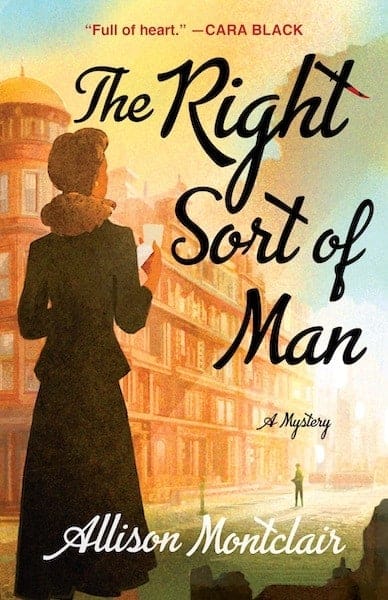
First comes love, then comes murder.
In a London slowly recovering from World War II, two very different women join forces to launch a business venture in the heart of Mayfair—The Right Sort Marriage Bureau. Miss Iris Sparks, quick-witted and impulsive, and Mrs. Gwendolyn Bainbridge, practical and widowed with a young son, are determined to achieve some independence and do some good in a rapidly changing world.
But the promising start to their marriage bureau is threatened when their newest client, Tillie La Salle, is found murdered and the man arrested for the crime is the prospective husband they matched her with. While the police are convinced they have their man, Miss Sparks and Mrs. Bainbridge are not. To clear his name—and to rescue their fledging operation’s reputation—Sparks and Bainbridge decide to investigate on their own, using the skills and contacts they’ve each acquired through life and their individual adventures during the recent war.
Little do they know that this will put their very lives at risk.
Buy this book
Note: Clicking links on this site will take you to the retailer’s purchase page.
Totally Bex is a participant in the Amazon Services LLC Associates Program, an affiliate advertising program designed to provide a means for us to earn fees by linking to Amazon.com and affiliated sites.




